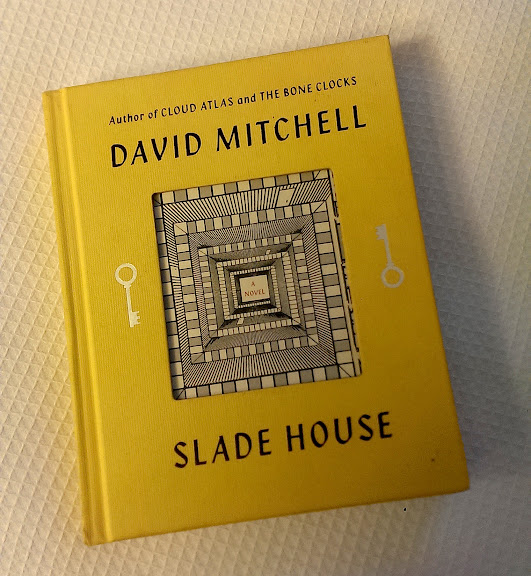 I really enjoyed this book but explaining why is complicated.
I really enjoyed this book but explaining why is complicated.
First, I should say that before Slade House, I read every other David Mitchell book except for The Thousand Autumns of Jacob de Zoet*, I believe in this order:
- The Bone Clocks (2014)
Ghostwritten (1999)
Cloud Atlas (2004)
Number9Dream (2001)
Black Swan Green (2006)
Though I was struck by the gorgeous and skillful language of all five, Bone Clocks was far and away my favorite. Soon after, I read a review in the NY Times where the critic wrote that it "felt like a misfire," with a plot that "felt soft and formulaic" and read "like second-rate fantasy fiction" (of course, I vehemently disagreed!), and that the recurring characters from Mitchell's previous books seemed “less like Yoknapatawpha and more like Marvel.” Not having read any of his other books at the time, this didn't mean much to me, but I did pick up on the fact it wasn't intended as a compliment.
Over the last year, though, I've read everything except Jacob*, so now I see what he was getting at: Although the books are all self-contained, they do all seem to take place in the same universe, with the same characters or clans of characters appearing regularly (sometimes as central figures, sometimes as cameos), and taken as a whole, I could sort of see Mitchell weaving together a larger story, each book existing in its own little narrative eddy. So it was unsurprising to me to hear that Slade House was sort of a sequel to Bone Clocks.
For better or worse, that was the effect of reading Bone Clocks first. It's definitely the most explicit, sprawling, lay-it-all-out, this-is-what's-going type of story of the six, and I can see how someone might not pick up all the connections if they started with Ghostwritten and read according to publication order. I also think maybe that explicitness was what some people didn't like about Bone Clocks, having become accustomed to the oblique nature of the books that came before. (Also, I'm a huge fan of what you might call "intellectual horror" or "literary horror" or whatever, which I think Bone Clocks has a lot in common with, and I can see maybe a subset of Mitchell's usual audience not really going for that.)
So. I say all that to say that if you enjoyed Bone Clocks, you are more likely to enjoy Slade House than if you enjoyed Mitchell's other books more and Bone Clocks less. It's short, apparently an elaboration on a short story he wrote called The Right Sort. If Bone Clocks flirts with intellectual/literary horror, Slade House straight-up propositions it. The story is divided into three parts and revolves around a mysterious manor house (the eponymous Slade House), with each part following a character as they visit the house and its odd inhabitants. Not all of their fates are happy. If you've read Bone Clocks, by the second or third story you see the connection between the two books and will probably figure out sooner than other readers how it's going to end.
I can see why readers who enjoyed Cloud Atlas and Ghostwritten more might not be as big on Slade House. It's short and fairly to the point, not quite as literary, and more focused on telling a grizzly tale than on patiently and artfully developing nine-dimensional characters and abstract, highly literary themes. Still, Mitchell's skill with language and story craft in general shines through, which made it (at least for me) a satisfying, undemanding, yet highly entertaining read.
* I started Jacob in December and abandoned it after 100 pages because I just could not get into it. (Sorry, David Mitchell; six out of seven still ain't bad!)

No comments:
Post a Comment